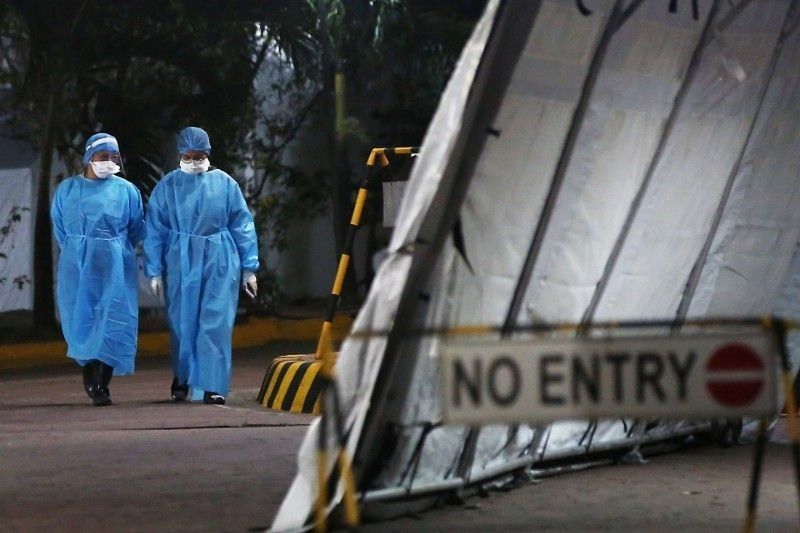Non-COVID-19 deaths increasing – Galvez

MANILA, Philippines — Non-COVID illnesses have increased four-fold from March to April, according to National Task Force Against COVID-19 response chief implementer Carlito Galvez Jr.
In a report to President Duterte on Monday night, Galvez said the task force is also looking into non-COVID cases.
“Based on data we have on the top 10 leading causes of death in the Philippines, we have seen that heart disease, cancer, chronic respiratory and diabetes are also leading causes of deaths. Based on data in March and April, our casualty for non-COVID cases are four times. Our strategy is we are also strengthening our preparation for renal patients,” Galvez said without elaborating.
Galvez said the task force has set up 20 renal machines in Cebu which could serve 1,600 renal patients, and is now undergoing the process to get a license to operate.
He added that the government needs to modernize the country’s long-neglected healthcare system.
In a related development, President Duterte reiterated the appeal to private hospitals to increase the number of beds dedicated to COVID-19 patients during his meeting with members of the Inter-Agency Task Force on the Management of Emerging Infectious Diseases last Monday.
“Madagdagan lang ho sana ninyo (I hope you can increase it) because, still, the numbers are increasing. The infections vary,” the President said.
Duterte echoed the statement of Health Sec. Francisco Duque III, noting that the recovery rates in provinces vary.
Some are able to have a fast recovery rate while others are lagging behind, he added, attributing the scenario to the early detection by some that results in early isolation and treatment.
“So, some are lagging behind. Maybe you can help the country. I am appealing this for the country and for the people. You know that we are not only the ones hit so your help will go a long way…” he said.
“Everybody will remember someday that there was this great epidemic that passed by our lives and we were able to deal it with a lot of mutual help and the help of our fellow countrymen,” Duterte said.
At the same meeting, Galvez said the task force is working to increase bed capacities at hospitals.
Galvez thanked the President for signing Bayanihan 2, or the Bayanihan to Recover As One Act, which allocates P4.5 billion for constructing isolation centers, securing hotel rooms for isolation and providing additional hospital beds.
He said the government has a total of 79 hotels in its inventory with 7,114 beds intended for isolating those who contracted the virus.
The task force chief added that an additional 1,006 COVID-dedicated hospital beds are also expected in new facilities that would be ready by November.
According to Galvez, businessman Manuel V. Pangilinan has donated P47 million to provide 250 dedicated beds to COVID-19 patients at the East Avenue Medical Center (EAMC) in Quezon City. It will be added to 25 existing ICU beds at EAMC.
He also reported that there are 200 beds at Rizal Medical Center, and similar efforts are being done at UP-Philippine General Hospital and Batangas Medical Center.
Local Government Secretary Eduardo Año said the Department of the Interior and Local Government will hire 50,000 contact tracers throughout the country to be funded by the P5-billion allocation from Bayanihan 2.
Meanwhile, the proposed measures that will institutionalize the scholarship program for medical students will help address the shortage of doctors in the country, according to the Commission on Human Rights.
CHR spokesperson Jacqueline de Guia said the proposed legislations, which have been approved at the Senate and House of Representatives, will enable more doctors to serve in communities and contribute to the improvement of the country’s healthcare system.
“The current health crisis brought by the pandemic has revealed the shortage of medical personnel in the Philippines. It also brought to attention another lingering problem – the uneven distribution of health workforce,” she said.
“Medical workers and hospitals are concentrated in urban areas, which greatly disadvantages the rural communities. Through the proposed measure, we can expect more doctors to serve their own community and contribute to the improvement of health status, particularly in rural and remote areas,” she added.
Commission on Higher Education chairman J. Prospero de Vera III said they will organize a technical working group in anticipation of the signing of the measure.
“We support it because it will institutionalize our medical scholarship program and ensure its sustainability,” he added.
De Vera earlier piloted the program, which aims to provide tuition fee subsidy and financial assistance to medical students enrolled in identified state universities and colleges.
The proposed legislations will institutional the initiative, which has been dependent on the annual budget allocation approved by Congress.
A budget of P167 million was allocated for the program this year. – Christina Mendez, Janvic Mateo
- Latest
- Trending



























